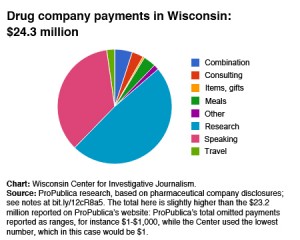State Doctors Rake in Millions from Drug Companies
Data base shows pharmaceutical companies gave $10 million in speaking fees, meals and gifts to WI doctors.

Journalist Steven Brill, in his recent 24,000-word Time magazine article on how the U.S. medical establishment is fleecing consumers, touted a database run by ProPublica, the Pulitzer Prize-winning nonprofit newsroom.
This database, Dollars for Docs, logs payments from pharmaceutical companies to health professionals. Critics say this encourages recipients to use and recommend the products of these companies, with health insurers and consumers picking up the tab.
Updated in March, the database now itemizes $2 billion in payments from 2009 through 2012.
The actual total is much higher. The database only includes payments from the 15 drug companies — about half the U.S. market in sales — that disclose this information. And some have not reported all four years. (New rules will require industry-wide disclosure by September 2014.)
While the site lets anyone do simple searches, a subset of state data provided to the Wisconsin Center for Investigative Journalism allowed for more detailed analysis.
In all, more than $24 million has gone to Wisconsin health professionals since 2009. Eli Lilly and Pfizer each spent about $6 million, followed by Merck and AstraZeneca at about $3 million.
Three-quarters of the nearly 21,000 individual outlays were for meals. The largest expense category, at about $12 million, was for research.
Rick Abrams, CEO of the Wisconsin Medical Society, calls drug-company spending on research “really important” to the cause of medicine, especially now that federal spending is being pinched.
But Wisconsin providers also received about $9 million for speaking fees, and about $1 million in meals and gifts. The Medical Society advises: “Physicians shall accept no gifts from any provider of products that they prescribe to their patients.” Its non-binding rules also direct physicians to not speak on behalf of health product companies.
Finding recipients willing to discuss specifics is not easy.
A half-dozen Wisconsin practitioners listed in the database passed up opportunities to comment. These include Todd Mahr, a pediatric allergist and immunologist in La Crosse (roughly $370,000 since 2009), lipidologist Tara Dall of Delafield ($260,000) and family practitioner Daniel Duffy of Cedarburg ($250,000). Most of these payments were for speaking and educational forums.
Mutsumi Ishii, a Sun Prairie psychiatrist who’s received more than $350,000 from nine different drug companies, also did not respond. But a spokeswoman for Dean Clinic, where Ishii works, said clear rules prohibit the acceptance of anything “in exchange for prescribing drugs or other products” or that could be seen as interfering with patient care.
Bhupendra Khatri, a Milwaukee neurologist who specializes in multiple sclerosis, defends the $240,000 he’s gotten from drug companies since 2009, mostly for speaking.
“We work for it,” Khatri says. “We take time off from our clinic and time off from our family” to travel to speak. He says the large number of new MS drugs make this education needed, and insists there’s no favoritism toward certain companies: “We prescribe everything that’s available.”
Khatri and Barry Gidal, a professor at the University of Wisconsin-Madison School of Pharmacy, stress that drug talks are highly regulated by the U.S. Food and Drug Administration.
“You can’t just go out and say whatever you want,” says Gidal, who has been paid $110,000 since 2009 by two drug companies for speaking and consulting. Gidal, not a prescribing physician, says he is performing a useful educational role in sharing his expertise on the “extremely complicated” drugs used to treat epilepsy.
And while Gidal supports full disclosure of these payments, he says it’s unfair to conclude that a practitioner who accepts them is doing something wrong.
“The pharmaceutical companies,” he argues, “do play a valuable role in our health care system.”
The nonprofit Wisconsin Center for Investigative Journalism (www.WisconsinWatch.org) collaborates with Wisconsin Public Radio, Wisconsin Public Television, other news media and the UW-Madison School of Journalism and Mass Communication. This story was a produced in collaboration with Wisconsin Public Television.
All works created, published, posted or disseminated by the Center do not necessarily reflect the views or opinions of UW-Madison or any of its affiliates.
-
Wisconsin Lacks Clear System for Tracking Police Caught Lying
 May 9th, 2024 by Jacob Resneck
May 9th, 2024 by Jacob Resneck
-
Voters With Disabilities Demand Electronic Voting Option
 Apr 18th, 2024 by Alexander Shur
Apr 18th, 2024 by Alexander Shur
-
Few SNAP Recipients Reimbursed for Spoiled Food
 Apr 9th, 2024 by Addie Costello
Apr 9th, 2024 by Addie Costello






















I used to work at an outpatient mental health clinic. On a regular basis, sales reps from the drug companies would come to see the doctor, the pharmacist, and the nurses, but primarily the doctor. Coincidentally or not, they were young, attractive, and very friendly, outgoing women. They always brought a supply of pens, note pads, keychains etc that they would “donate.” Additionally the drug companies would sponsor “seminars” open to all of the staff which were dinners that they paid for which featured some doctor giving a talk on some facet of mental illness. Examples might be a talk on borderline personality disorder or schizoaffective disorder. I used to question these efforts by the drug companies. Staff would assure me that while these things might influence some people, they had no effect on them as they would not let it affect their judgment. Pride goeth before the fall. These are powerful, wealthy corporations who you can be sure have spent a lot of time and effort figuring out what works toward keeping them rich and powerful. They are not doing this out of the kindness of their hearts and all of the costs involved in their efforts are rolled over into the costs of medications which are more or less arbitrary. Just one more reason why we need a single payer health system.